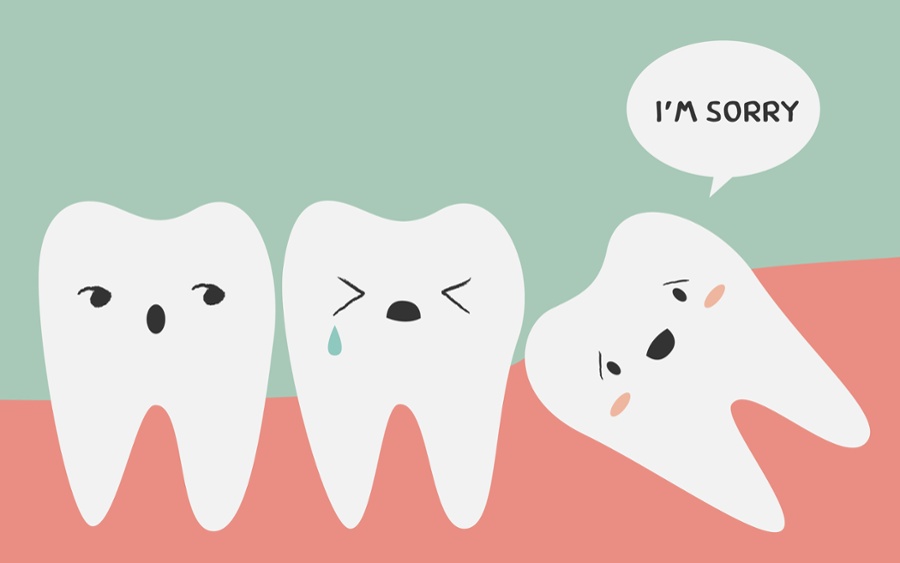According to the American Dental Association, wisdom teeth are actually a "dental milestone" marking the onset of early adulthood.
Our evolutionary history may reveal yet another clue as to why wisdom teeth have stuck around for so long. When our brains grew by leaps and bounds, the dental space shortened to enable our jaws to connect to our lower skulls. However, the genetic signaling for how many teeth came in remained the same.
This means the space got pretty crowded in there. Today, this lack of room has led to about 5 million people having their wisdom teeth removed each year in the United States alone.
While wisdom tooth extraction is very common, many people still have questions about the procedure, such as how safe it is, its health benefits, and what steps need to be taken before, during, and after the surgery. In this short guide, we'll help answer these questions for you. Our goal is to assist you in making the most well-informed decision about wisdom tooth extraction surgery for your smile, your confidence, and your long-term dental health.
Wisdom Teeth 101
What are Wisdom Teeth?
Wisdom teeth are an extra pair of molars that emerge at the back of your dental row, and they're the last teeth to grow in. They typically show up between the ages of 17 and 21, although for some people they might not make an appearance until their mid-twenties.
These teeth are your third set of molars, and they develop on the top and bottom of your mouth at each end, for a total of four teeth. In a rare number of cases, people may develop more than four extra teeth, and these are known as supernumerary teeth.
Although wisdom teeth were thought to be used for grinding down tough meat, nuts, and roots during the hunting and gathering eras, they're now considered unnecessary because of today's softer modern diet.
Why are Wisdom Teeth Considered So 'Wise'?
That's a great question.
In Britain in the late 1600s, the emerging field of dentistry gave the world "operators of the teeth" such as the lively character Charles Allen. His 17th-century treatise on his profession reveals the first humorous mention of how wisdom teeth got their name:
"such teeth are called by some Teeth of wisdom; because by that time we should have full use of our Rational faculty, tho' God knows how often it proves to be true." - Charles Allen
"Teeth of wisdom", as Mr. Allen dubbed them, eventually got shortened to 'wisdom teeth', which is a nod to the fact that they develop just as people are leaving behind their childhood for the 'wiser' stage of adulthood.
Impacted and Non-Impacted Wisdom Teeth
A wisdom tooth that breaks through the gums fully and at a normal angle is considered a non-impacted tooth.
However, many wisdom teeth either become partially or fully impacted. This means that they may come through the gum at an odd angle, partially, or not at all. The lack of room in the mouth is the reason so many wisdom teeth can't break through the gums properly.
As you might expect, impacted wisdom teeth tend to become infected and decay more often than non-impacted teeth because they are harder to clean.
The Benefits of Removing Your Wisdom Teeth
Both impacted and non-impacted wisdom teeth that remain in your mouth can increase your chances of developing a number of painful and debilitating dental issues. This is because food tends to get stuck in between them since they're so tightly packed into your mouth. This makes effective flossing and brushing much more difficult. In fact, 95% of pericoronitis cases (swelling and infection around a tooth) occur around lower wisdom teeth.
This overcrowding in your mouth also negatively impacts your smile because your teeth can become misaligned and uneven-looking. That's why the benefits of having your wisdom teeth removed are enormous. They include helping you avert:
- Gum Inflammation
- Bacterial Infections
- A Crooked Smile
- Bad Breath
- Jaw Pain
- Bleeding Gums
- Cavities/Tooth Decay
- Oral Cysts that Can Lead to a Weak Jaw and Breathing and Sleeping Issues
- Spread of Infection to Your Other Teeth
Removing your wisdom teeth now helps you avoid these issues, preserve your smile, and prevent painful gum, jaw, and health issues in the future.
How to Prepare to Have Your Wisdom Teeth Removed
Your wisdom teeth may already have come in, or you may have the common symptoms that they are growing, like tender gums, jaw pain, swelling, and an uncomfortable time chewing. We will determine what stage of development your wisdom teeth are at and their condition by doing a complete exam. Before your surgery, we'll screen you for any underlying medical conditions and go over the benefits and risks of the procedure. Sometimes infections need to be cleared up with antibiotics before your extraction surgery can be scheduled.
To help you prepare for surgery, we'll review any medications you may be taking, discuss the types of sedation that are available, and provide you with at-home oral care instructions. We also recommend that you have someone available to drive you home after the surgery because you'll likely be too groggy to drive yourself.
Your Wisdom Tooth Extraction Surgery
Your comfort is our top priority during surgery, and we'll administer local sedation to numb the area and sedation anesthesia if you choose, so that you can quickly relax and wake up after the surgery with little to no recollection of the extraction. We also make noise-canceling headphones and dark sunglasses available for you to help keep your environment calm and stress-free.
To extract your wisdom teeth, the dentist will make an incision into your gums and remove the teeth and any necessary bone. The incision is then closed up, sutured, and packed with gauze. It will typically take about an hour or two to complete the procedure.
What to Expect After Having Your Wisdom Teeth Removed
Most people who have their wisdom teeth removed can expect to be back to their normal activities after about two days, and eating regular food after about a week. Until then, we recommend soft foods and plenty of rest. We will provide you with a complete set of aftercare instructions and the medication you need to make sure you're comfortable while you recover.
During recovery, your gums may be swollen or bleeding, and it could take several weeks for your mouth to heal completely. We'll make a follow-up appointment with you to remove any non-dissolving sutures, and we can also schedule additional procedures if your wisdom teeth impacted the health of your other teeth.
The Palmetto Dental Arts Difference
We often see people who haven't been to a dentist in many years, and who have emotional blocks to getting into a dentist's chair. Our motto is 'person over patient', and that's why we focus on a personal connection to make sure you're as comfortable as possible during your oral surgery. Here's what you can expect from our team at Palmetto Dental Arts:
- We offer a free consultation so you know just what to expect, including pre-procedure preparation, the steps we'll take during surgery, post-procedure care, pricing, and any questions you might have about the surgery's impact on your oral health.
- All our work is done in-house. We have an on-site periodontist and three general dentists, and each tooth is extracted with the utmost care, safety, and expertise.
- We offer membership savings plans to provide you with greater access to quality dental care.
- All our dentist staff is certified in sedation dentistry to ensure you're as comfortable as possible.
- You always have the option of using the patient blankets, noise-blocking headphones, and dark glasses we provide to ensure a calm, stress-free surgery.
Contact us today to get started on learning how wisdom tooth extraction surgery can help keep your mouth healthy and your smile brilliant for years to come!




